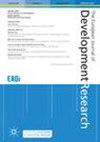Corruption Criminal Accountability in the Management of Village Owned Business Entities (BUM Desa)
IF 2.6
3区 社会学
Q2 DEVELOPMENT STUDIES
引用次数: 0
Abstract
The development of the spirit of regional autonomy is characterized by the enactment of Law Number 22 of 1999 concerning Regional Government, which encourages Villages to establish a business entity that aligns with the needs of the local community. This business entity is commonly referred to as Village-Owned Enterprises (BUM Desa). Village-Owned Enterprises are used to manage a business, utilize assets, develop investment and productivity, provide services and/or provide other types of businesses. With its status as a legal entity, the role of Village Owned Enterprises is increasingly important as a consolidator of community products/services, producers of various community needs, incubator of community businesses, providers of public services and various other functions. The development of Village-Owned Enterprises which have their own wealth originating from APBN and/or APBD funds is inseparable from the poor management carried out by Village-Owned Enterprises who abuse the authority they have. Furthermore, this abuse of authority can have implications for criminal acts of corruption in the management of village-owned enterprises, which can be held accountable for criminal corruption for perpetrators. This study uses normative research methods. The result of this research is that it is necessary to assert in the legislation that regulates the mechanism of settlement and accountability of Village-Owned Enterprises (BUM Desa) for errors and/or negligence in the management of BUM Desa.村办企业管理中的腐败刑事问责
区域自治精神的发展体现在1999年颁布了关于区域政府的第22号法律,该法律鼓励村庄建立符合当地社区需求的商业实体。这种商业实体通常被称为村企(BUM Desa)。村企被用来管理企业,利用资产,发展投资和生产力,提供服务和/或提供其他类型的业务。作为一个法律实体,乡村企业作为社区产品/服务的整合者、各种社区需求的生产者、社区企业的孵化器、公共服务的提供者和各种其他功能的作用越来越重要。以APBN和(或)APBD资金为自有财富的村企的发展,与村企滥用职权的管理不善是分不开的。此外,这种滥用权力的行为可能会对村属企业管理中的腐败犯罪行为产生影响,村属企业可以对肇事者的腐败犯罪行为负责。本研究采用规范的研究方法。本研究的结果是,有必要在立法中主张规范村镇企业管理中的错误和疏忽的解决和问责机制。
本文章由计算机程序翻译,如有差异,请以英文原文为准。
求助全文
约1分钟内获得全文
求助全文
来源期刊

European Journal of Development Research
DEVELOPMENT STUDIES-
CiteScore
5.70
自引率
4.00%
发文量
77
期刊介绍:
The European Journal of Development Research (EJDR) redefines and modernises what international development is, recognising the many schools of thought on what human development constitutes. It encourages debate between competing approaches to understanding global development and international social development. The journal is multidisciplinary and welcomes papers that are rooted in any mixture of fields including (but not limited to): development studies, international studies, social policy, sociology, politics, economics, anthropology, education, sustainability, business and management. EJDR explicitly links with development studies, being hosted by European Association of Development Institutes (EADI) and its various initiatives.
As a double-blind peer-reviewed academic journal, we particularly welcome submissions that improve our conceptual understanding of international development processes, or submissions that propose policy and developmental tools by analysing empirical evidence, whether qualitative, quantitative, mixed methods or anecdotal (data use in the journal ranges broadly from narratives and transcripts, through ethnographic and mixed data, to quantitative and survey data). The research methods used in the journal''s articles make explicit the importance of empirical data and the critical interpretation of findings. Authors can use a mixture of theory and data analysis to expand the possibilities for global development.
Submissions must be well-grounded in theory and must also indicate how their findings are relevant to development practitioners in the field and/or policy makers. The journal encourages papers which embody the highest quality standards, and which use an innovative approach. We urge authors who contemplate submitting their work to the EJDR to respond to research already published in this journal, as well as complementary journals and books. We take special efforts to include global voices, and notably voices from the global South. Queries about potential submissions to EJDR can be directed to the Editors.
EJDR understands development to be an ongoing process that affects all communities, societies, states and regions: We therefore do not have a geographical bias, but wherever possible prospective authors should seek to highlight how their study has relevance to researchers and practitioners studying development in different environments. Although many of the papers we publish examine the challenges for developing countries, we recognize that there are important lessons to be derived from the experiences of regions in the developed world.
The EJDR is print-published 6 times a year, in a mix of regular and special theme issues; accepted papers are published on an ongoing basis online. We accept submissions in English and French.
 求助内容:
求助内容: 应助结果提醒方式:
应助结果提醒方式:


